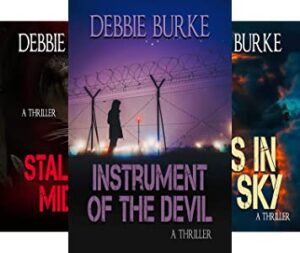by Debbie Burke

Happy New Year, TKZ friends!
Tonight, all over the world, millions of people will sing “Auld Lang Syne.”
So what the heck does “Auld Lang Syne” mean?
The literal translation from Scottish is “old long since.” In 1788, Robert Burns wrote down a Scottish folk poem that he claimed came “from an old man’s singing.” The poem wasn’t published until after Bobby’s death in 1796.
The melody was from a 1782 opera but had different lyrics.
In 1799, the tune was combined with the Burns poem to celebrate Scottish Hogmanay (New Year’s celebration):
“Hogmanay celebrants traditionally sing the song while they stand in a circle holding hands.” (source: Britannica.com)

The last verses from Bobby’s original poem read as if a cat scampered across a keyboard:
“We twa hae paidl’d i’ the burn,
Frae mornin’ sun till dine;”“we’ll tak a right guid willy waught,
For auld lang syne.”
Here’s the English version of the later verses:
We two have run about the slopes,
And picked the daisies fine;
But we’ve wandered many a weary foot,
Since auld lang syne.We two have paddled in the stream,
From morning sun till dine;
But seas between us broad have roared
Since auld lang syne.And there’s a hand my trusty friend!
And give me a hand o’ thine!
And we’ll take a right good-will draught,
For auld lang syne.
The last day of 2024 seems like a good time to take stock of writing progress during the past year.
My 2024 goal list was seven items. I can check off four as completed or making substantial progress. Those are:
- Publish the ninth novel in the Tawny Lindholm Thriller series. Fruit of the Poisonous Tree launched October 1, 2024. Checked off.
- Start an editing business. For years, writer friends urged me to go pro with editing services. Last January, I hung out a shingle. Through word-of-mouth recommendations, I earned more in the first two weeks of editing than I did the entire previous year in book sales. Check that off as a big success.
- Do more teaching and personal appearances. I talked with book clubs, taught workshops, participated on panels, and sold books at festivals. These are fun activities because I love to meet readers and writers. Check this off as a success with plans to continue in 2025.
- Work on my nonfiction craft book The Villain’s Journey. This is a long-term project. In 2024, I made substantial progress with research, writing, obtaining permission to quote sources, and refining the structure. This project rolls over into 2025 with a goal to finish and publish The Villain’s Journey by summer 2025.
What items on my list were fails?
- Do more marketing, advertising, and promotion. For years, this goal remains my perennial failure. Will I do better next year? We’ll see.
- Create box sets of my Tawny Lindholm Thriller series. I didn’t get around to this project and will roll it over into 2025.
- Start a Substack. Another project I didn’t get around to. Rolled over into 2025.
Goals are important for writers because we’re often working toward a nebulous, uncertain future where progress is hard to quantify.
Unless you have a set deadline, it’s easy to fall back on Someday. Someday I’ll finish my novel, or learn Scrivener, or run Amazon/Facebook ads, or [fill in the blank].
At the start of each year, members of my critique group submit a list of goals we want to accomplish. At the end of the year, we review the lists to see how we did. We’re usually pleasantly surprised by how many items we checked off.
When you write down specific goals AND show them to others, that’s a small but effective step to make you more accountable for your progress.
TKZers, want to try an experiment? Write down your 2025 goals and share them in the comment section. Next year at this time, we’ll review the comments and see how we did.
While Rod Stewart sings “Auld Lang Syne,” I’m raising a toast to The Kill Zone community.
Wishing you a happy and creative 2025!
~~~
Start the New Year with new reading at a bargain price.
Tawny Lindholm Thrillers – select titles are 50% off !!! Today is the last day of the sale.




 As this is my last post here before TKZ takes its annual holiday break, I’d like to wish everyone my best wishes for a happy holiday season, no matter what you celebrate. And if you don’t celebrate any holidays in December, I wish you a happy month.
As this is my last post here before TKZ takes its annual holiday break, I’d like to wish everyone my best wishes for a happy holiday season, no matter what you celebrate. And if you don’t celebrate any holidays in December, I wish you a happy month. My normal style is to alternate chapters between my POV characters. Which brings me to transitions.
My normal style is to alternate chapters between my POV characters. Which brings me to transitions. Shalah Kennedy has dreams of becoming a senior travel advisor—one who actually gets to travel. Her big break comes when the agency’s “Golden Girl” is hospitalized and Shalah is sent on a Danube River cruise in her place. She’s the only advisor in the agency with a knowledge of photography, and she’s determined to get stunning images for the agency’s website.
Shalah Kennedy has dreams of becoming a senior travel advisor—one who actually gets to travel. Her big break comes when the agency’s “Golden Girl” is hospitalized and Shalah is sent on a Danube River cruise in her place. She’s the only advisor in the agency with a knowledge of photography, and she’s determined to get stunning images for the agency’s website. Like bang for your buck? I have a
Like bang for your buck? I have a 




 Characters need personal growth to achieve their goals. If the character seeks to improve themselves in some way — at work, in relationships, or spiritually — or defeat the villain, their fatal flaw will often sabotage early efforts.
Characters need personal growth to achieve their goals. If the character seeks to improve themselves in some way — at work, in relationships, or spiritually — or defeat the villain, their fatal flaw will often sabotage early efforts.



 What about the food in the fridge: Has the milk soured, the produce wilted, or the meat spoiled?
What about the food in the fridge: Has the milk soured, the produce wilted, or the meat spoiled?





